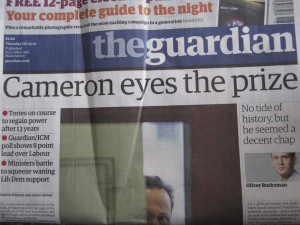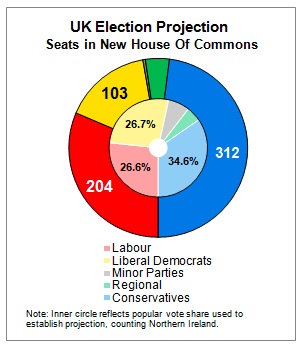Wonder if he broke into a sweat?
Category Archives: Asides
Hollywood Boobs
The film critic of ye olde Financial Times is in Cannes, don’t you know, for the filmfest, and reports as follows:
A casting notice for Disney’s Pirates of the Caribbean 4, shooting now, said actresses “must have real breasts. Do not submit if you have implants.” Auditionees will reportedly be subjected to a “jiggling test”, as brutally decisive, no doubt, as the ducking stool in witch-hunting days.
So now you know.
How different from the good ol’ days. One of my fondest memories of Cannes is a report by the incomparable Barry Norman in which he told of a publicity stunt involving two topless starlets playing ping-pong on the beach,”watched by 200 male journalists, none of whom could have said with any certainty where the ball was at any given moment”.
The big question…
Touchy subjects
I went to see my GP on Monday. Upon arrival, I noticed that there was a touchscreen monitor on the reception desk. “Touch here to arrive for your appointment” it said. “Arrive???” Resisting the temptation to point out the grammatical absurdity of the invitation to the receptionist, I duly ‘touched’ the screen and was invited to enter my date of birth, after which a welcome message flashed up.
Sitting in the waiting room, I fell to reflecting on this. During the swine-flu panic, we were constantly exhorted to avoid touching strange doorknobs etc. And yet here we are in a GP’s surgery merrily placing our various germs on a common screen. Hmmm…
Later, in one of those lovely serendipitous coincidences, this message from a long-term correspondent popped into my inbox:
My local surgery is very progressive. On the information side, their mail/email handling of repeat prescriptions is first class.
Recently however they have introduced, as an alternative, a touch screen check in system…. (an NHS standard ?).
You may check in for a scheduled appointment by using by the touch screen. First, however you need to wipe your hands with antiseptic gel. There is a large notice telling you do so. Standing next door to this facility whilest collecting my repeat prescription, I noted that out of 7 users, 3 omitted to clean their hands…
I still use the ‘person to person confrontational’ check in. As a regular, the receptionists know me and greet me and we exchange pleasantries in a friendly fashion. As far as I know we don’t infect each other. She often gives me additional information unknown to the automated system. e.g. which end of the reception area to sit for my blood test call.
Oops!
A huge fall in the Dow appears to have been caused after a trader inputting details hit the button for billion not million.
The Dow’s overall rate fell by nearly a thousand points in an anomalous pattern that had the Nasdaq and New York Stock Exchange announcing they would cancel all trades more than 60 percent above or below market that occurred between 2:40 p.m. and 3:00 p.m. New York time.
According to CNBC the problem came when a deal involving Proctor and Gamble shares was incorrectly entered.
“We, along with the rest of the financial industry, are investigating to find the source of today’s market volatility,” Citigroup said in a statement.
“At this point we have no evidence that Citi was involved in any erroneous transaction.”
Proctor and Gamble shares fell by over a third on the day’s trading.
“We don’t know what caused it,” said Procter & Gamble spokeswoman Jennifer Chelune.
“We know that that was an electronic trade…and we’re looking into it with Nasdaq and the other major electronic exchanges.”
[Source]
Putin’s web

Moscow by night — seen from space.
Famous last words (or why experts know nothing)
“Children just aren’t interested in Witches and Wizards anymore.” – Anonymous publishing executive to J.K. Rowling, 1996. “Who the hell wants to hear actors talk?” – H. M. Warner, co-founder of Warner Bros. 1927. “There is no reason anyone would want a computer in their home.” – Ken Olson, Founder of Digital Equipment Corp., 1977. “We don’t like their sound, and guitar music is on the way out.” – Decca Records executives rejecting the Beatles, 1962. “You better get secretarial work or get married.” – Emmeline Snively, Director, Blue Book Modelling Modelling Agency, to Marilyn Monroe in 1944. “The horse is here to stay but the automobile is only a novelty, a fad.” – The President of the Michigan Savings Bank advising Henry Ford’s lawyer not to invest in the Ford Motor Co., 1903. “I would say that this does not belong to the art which I am in the habit of considering: music.” – Alexandre Oulibicheff, reviewing Beethoven’s Fifth Symphony. “I’m sorry, Mr. Kipling, but you just don’t know how to use the English language.” – The San Francisco Examiner, rejecting a submission by Rudyard Kipling in 1889. “The Americans have need of the telephone, but we do not. We have plenty of messenger boys.” – Sir William Preece, Chief Engineer, British Post Office, 1878. “A cookie store is a bad idea. Besides, the market research reports say America likes crispy cookies, not soft and chewy cookies like you make.” – Response to Debbi Fields’ idea of starting Mrs. Fields’ Cookies. The world potential market for copying machines is 5000 at most.” – IBM, to the eventual founders of Xerox, saying the photocopier had no market large enough to justify production, 1959.
[Source]
What iPads did to one techie’s family
Apple has announced that the iPad will be on sale in the UK from May 28 and is enabling pre-ordering from next Monday (May 10). Already members of my family are eyeing me in a meaningful way. All of which makes this blog post by Chuck Hollis, Vice-President and Global Marketing CTO of EMC Corporation, such a sobering read. He relates how he bought an iPad and then left it at home for a week while he went away on a business trip.
I get home and there’s always a certain level of chaos at that time.
But there was a new theme this week.
“Who forgot to charge the iPad?”
“Hey, if you’re going to eat pizza and use the iPad, at least wipe it! How gross!”
“You already used the iPad this afternoon, it’s my turn!”.
“How do I print from this thing?” “Can we download some more games?”. “Check out this cool video”.
Tap, tap, tap.
All the PCs and laptops are basically not being used. All the Macs are not being used. All have been powered off.
Everyone in the family is waiting for their turn at the iPad.
My wife asserted her rightful place in the hierarchy later that evening, and took it upstairs to the bedroom to relax while watching TV. Tap, tap, tap. Occasionally, she showed me something interesting she found online. And smiling.
It All Flashed Through My Eyes
I don’t think I’ll be buying any more desktops going forward. I don’t think I’ll even be buying any more laptops going forward.
They’ve all been largely obsoleted (at least at my home) by a sleek $499 device that doesn’t really have any right to be called a ‘computer’ in the traditional sense.
Sure, there’s a handful of tasks that I still would prefer a real computer, but — amazingly — that list has now shrunk dramatically. In less than a week.
The members of my family immediately gravitated to the new shiny thing — no prompting, no encouragement, no migration, etc. They are drawn to it like a moth to flame.
I now have this strange love/hate relationship with Apple. And I think it won’t be long before I’m forced to make another trip back to the Apple store.
Hmmm…..
Newsweek RIP?
The Washington Post has put Newsweek for sale. End of an era and all that. Marion Maneker of Slate has a sardonic take on it. Excerpt:
When Newsweek repositioned itself last year as an American version of the Economist, the strategy was built upon a fatal misreading of the British magazine’s success. Over the last decade, as the weekly went from outdated vehicle to dead man walking, all eyes turned to the Economist. The magazine was the world’s unicorn: It had growing circulation in the United States, and it did not depend upon middlebrow trend-mongering or expensive writers with big egos who sucked the air out the room. Plus, this mythical beast appeared every week in the mail.
Much was made of the Economist’s intellectual appeal and its point of view. But the magazine offers the perspective of a member of the global financial class. The growth of that group—especially in the United States—has fueled the growth of the magazine. It gives the banker, lawyer, and businessman easy access to the world’s business and political news. It’s the first global magazine. And it has taken advantage of its long history, unique voice, and international position at the heart of London’s banking community to tap into the U.S. audience. With its anonymous, opinionated tone, it plays well to sheepishly provincial Americans. People subscribe to the Economist the way parents once bought expensive sets of the Encyclopedia Britannica. It’s an investment in the hope for future success.
You can’t emulate that.
LATER: Desmond Hanlon pointed me to James Fallows’s piece in The Atlantic in which he argues that
At least for print subscriptions, there appears to be a natural limit to the audience for different kinds of magazines. Let’s think of these in big, order-of-magnitude blocks. All figures here are approximate but true to the general pattern.
In their heyday, the likes of TV Guide and Reader’s Digest had circulations in the tens of millions. National Geographic has been over ten million.
The fallen giants — Look, Life, Saturday Evening Post — reached at their respective peaks somewhere between five and ten million.
At the other end of the scale, “opinion” magazines — The Nation, National Review, New Republic, Weekly Standard — seem to have a natural upper bound of around 100,000. For smaller political magazines, like my original employer The Washington Monthly, the upper-bound figure is more like 50,000.
The New Yorker‘s natural limit has appeared to be around one million; the Atlantic‘s, about half a million. Of course we all want to have ten times as many subscribers and readers as we do; and who knows, The Age of the Internets may make it all possible. The point for now is, there is a kind of natural matchup of magazine sensibility with audience size. (Eg, as shown by the categories for the National Magazine Awards.) And magazines that ignore this limit soon suffer; it’s like opening a 500-seat restaurant for a kind of cuisine that only 100 people are going to want to eat on any given night, or flying a 747 between Fresno and Bakersfield.
This brings us back to Newsweek. For the past generation or so, weekly news magazines have been set up for circulations of between about two and five million. US News on the low end, Time on the high end — but in all cases, the business logic of the magazines was based on this kind of scale. Rates for advertising; the kinds of advertisers they could attract; the staff they could employ; the kind of coverage and photography and design they would use. The Economist can do a very good business with a circulation of roughly half a million. Time and Newsweek and US News cannot. They’re built on a different scale. All the tech/death-of-media forces mentioned above have pushed the weeklies below their comfortable scale. Newsweek‘s redesign last year weirdly illustrated the predicament, by creating a more “interesting” magazine with a smaller natural readership.
I bet that most people who read the Atlantic, in print or online, thought that the new approach made Newsweek edgier, more provocative, more thoughtful, more original, and so on. More essay-type articles and cover stories; much less summing-up of the news. The Atlantic‘s audience would like this version of Newsweek better, because it has been more like the Atlantic — or the Economist, or the New Yorker, or the NYT Week in Review, or the New York Review of Books. These are all great publications. But none of them is going to have three million or more subscribers, which Newsweek‘s business model has historically been based upon. Newsweek became a “better” magazine – but a kind of magazine whose natural audience is smaller by definition. It would be as if McDonald’s or Applebee’s became a tapas bar — yet still needed to fill the same number of seats.
Inside the mind of the Beast
I found it hard to sleep last night, partly because I was brooding on today’s election. Lying awake, I was reminded of a metaphor which has struck me often in the years since Tony Blair ousted the Tories in 1997. In this the British electorate appears as a vast, lumbering beast — a kind of sleepy Leviathan. The Beast is not very interested in politics; in fact, most of the time it would prefer not to have to think about it at all. But every so often the buzzing of hornets (all of whom, in my dreams, look like Nick Robinson, the BBC’s Political Editor) annoys it into briefly paying attention to the fact that it has to make a decision. The Beast doesn’t like making decisions, so it tends to put off thinking about them until the last possible moment. And when it does decide, its choice is largely determined by two elementary factors. The first is boredom. The second is a vague — and not terribly enthusiastic — feeling that it’s time to let the other lot have a go.
This is the way all British elections are decided. Occasionally, the Beast makes its choice with a show of enthusiasm. This happened in 1997, for the obvious reason that the Tories had become so unutterably boring, incompetent and corrupt that even the apolitical Beast had noticed. In the 2002 and 2005 elections it opted to extend the New Labour hegemony with declining enthusiasm. But it was clear to some (most?) of us, that next time round it would be inclined to give the other lot a go. The succession of Gordon Brown clinched it — as Tony Blair had feared, and as I wrote about at the time.
As this interminable election campaign unfolded, the Beast was initially startled by a new kind of hornet — in this case the televised leaders’ debates. There was a lot of irritating buzzing about a ‘third way’ involving the Lib Dems and political realignment and constitutional reform. This initially sparked some interest in the Beast, but on inspection seemed to offer nothing but impenetrable complexity: it was a signpost to what looked like a thicket rather than a beaten path. So in the end the Beast decided that it was all too complicated and reverted to its time-honoured decision-rule.
The interesting thing, though, is that it does so with a distinct lack of enthusiasm. As I write, the BBC election seat calculator is predicting Con 284, Lab 257 LibDem 80 Others 29.
But FiveThirtyEight, the US analytical site which did such insightful work on the polls in the Obama election is predicting an interestingly different result: Cons 312, Lab 204 LibDem 103. I’m inclined to believe that this is what the Beast intends: a minority Tory government. But that probably means another election in October. Which only goes to show that the Beast isn’t much good at joined-up thinking. It can go back to sleep tomorrow — but not for long.




